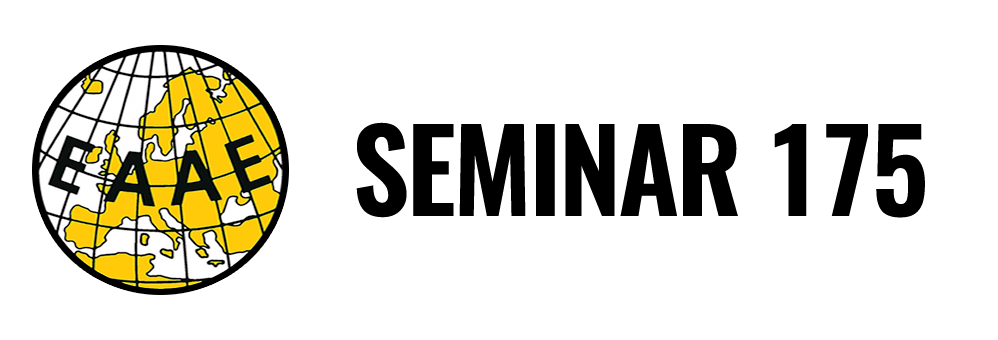Background
Existing societal challenges related to food security and safety, the creation of jobs and preservation of European competitiveness, the reduction of the dependence on non-renewable resources, the mitigation and adaptation to climate change and the sustainable management of natural resources have led towards new policy orientations based on the establishment of a bioeconomy in Europe.
At the same time, it is possible to observe a growing consumer attention towards food with reduced negative health and environmental impacts and an increasing role of sustainability as a quality attribute in food evaluations and choices.
These trends raise the issue of the sustainability of economic activities within value chains. Public and private sustainability standards are among the main tools that firms use to implement sustainable-related rules. The last decades show a proliferation of sustainability standards differing in terms of object of the analysis, agents involved, products targeted, schemes’ owners, legal validity, and level of traceability/complexity of the standard. Such standards are considered effective instruments to reduce market failures related to information, to improve stakeholders reputation and to introduce liability and trust among the agents of the supply chain. Moreover, they are used also as marketing tools for product differentiation.
An in-depth understanding of the market, policy and supply chain drivers and barriers influencing firms decision to implement different standards needs further empirical investigation. Moreover, the adoption of new standards implies firm and supply chain innovation capability and affects the vertical relationships within the value chain, as well as firm’s performances. There is a need for discussing current ideas related to theoretical and managerial approaches useful to understanding the economic dynamics of different standards. Moreover, issues on data challenges, reliable measures, and empirical applications to capture the effects of sustainability standards need to be explored.
Objectives
The objective of the seminar is to improve the understanding of the “wind of change” of sustainability standards and their effects on agricultural, food, and bio-based value chains by bringing together scholars having an interest in both theoretical and empirical research on the subject. Specific objectives are:
- To provide state of the art of the knowledge concerning the drivers and implications of sustainability standards in the bioeconomy;
- To discuss drivers and implications of sustainability standards from economic, governance, and policy perspectives;
- To identify the gaps in the theoretical and empirical understanding of the subject raising the main research questions for future research.
Topics
Economics of sustainability standards
- Consumer behaviour and sustainability certifications
- Models and trends of sustainable consumption
- Market, supply chain and regulatory drivers for standard adoption
- Market failures and sustainability standards
- Impact of standard adoption in markets and value chains, including performance and welfare analysis
Governance and sustainability standards
- Formal and informal forms of transaction governance in sustainable supply chains
- Horizontal and vertical relations in certified sustainable value chains
- Governing innovation in sustainable-related value chains
- Strategic management of food standards in value chains
- Business models for the design of sustainability standards
- Neo-institutional analysis of standards
- Multidisciplinary approaches for value chain governance
Policy and sustainability standards
- Private versus third party versus public sustainability certifications and labelling
- Policy evaluation for sustainable standards and cost-benefit analysis
- Regulations and innovation for sustainable value chains
- Behavioural instruments as a regulatory tools for sustainability
- Competition, market access, intellectual property rights and adoption of sustainability standards
Organization
Program Committee
- Zohra Bouamra-Mechemache – Toulouse School of Economics, France
- Tiziana De Magitris – CITA de Aragón, Spain
- Liesbeth Dries – Wageningen University, The Netherlands
- Jan Falkowski – University of Warsaw, Poland
- Jill Hobbs – University of Saskatchewan, Canada
- Kostas Karantininis – Swedish University of Agricultural Sciences, Sweden
- Stephan Marette – INRA, Grignon, France
- Claude Mènard – University of Paris, France
- Jill McCluskey – Washington State University, USA
- Rodolfo M. Nayga Jr. – University of Arkansas, USA
- Stefano Pascucci – University of Exeter, UK
- Loïc Sauvée – UniLaSalle, France
- Richard Sexton – University of California, Davis, USA
- Ian Sheldon – The Ohio State University, USA
- Jacques H. Trienekens – Wageningen University, The Netherlands
- Sofia Villas Boas – University of California, Berkeley, USA
- Justus Wesseler – Wageningen University, The Netherlands
Organizing Committee
- Stefanella Stranieri – University of Milan, Italy
- Claudio Soregaroli – Catholic University of Piacenza, Italy
- Alessandro Banterle – University of Milan, Italy
- Danilo Bertoni– University of Milan, Italy
- Stefano Boccaletti – Catholic University of Piacenza, Italy
- Elena Castellari – Catholic University of Piacenza, Italy
- Luigi Orsi – University of Milan, Italy
- Elena Claire Ricci – Univesity of Milan, Italy
- Paolo Sckokai – Catholic University of Piacenza, Italy
- Alessandro Varacca – Catholic University of Piacenza, Italy
